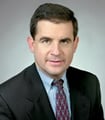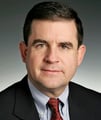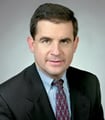
Office address: 50 Hudson Yards New York, NY 10001
Website: www.blackrock.com
Year established: 1988
Company type: investment company
Employees: 19,800+
Expertise: asset management, risk management, ETFs (iShares), fixed income, alternative investments, wealth management, retirement solutions, private equity, infrastructure, real estate, sustainable investing, financial technology
Parent company: N/A
Key people: Larry Fink (CEO), Rob Kapito (president), Joud Abdel Majeid (global head), Stephen Cohen (CPO), Ed Fishwick (CRO), Rob Goldstein (COO), Martin Small (CFO), Chris Meade (CLO)
Financing status: N/A
BlackRock is a global investment company from New York, offering asset management, advisory, and risk management services. The firm manages $11.5 trillion in assets as of October 2024 and operates in over 38 countries. With over 19,800 employees, the company serves clients in more than 100 countries, helping them achieve long-term financial well-being through innovative financial solutions.
BlackRock was founded in 1988 by Laurence Fink and seven partners, driven by a desire to manage assets with a focus on risk management and client interests. The company quickly grew, and in 1999, it launched Aladdin, its proprietary technology that transformed the risk management industry. During the 2008 financial crisis, the company was tapped by the Federal Reserve to assess Bear Stearns' assets, playing a crucial advisory role.
In 2009, it acquired Barclays Global Investors, becoming the world's largest asset manager and integrating both active and index strategies. In 2017, the company deepened its focus on investment stewardship, emphasizing the long-term value of purpose in profitability. By 2024, it partnered with Vestmark to boost model portfolios, further expanding its offerings for registered investment advisors.
BlackRock offers a wide range of investment products and services designed to meet the diverse needs of its clients. Below are the some of their key offerings:
BlackRock’s global team provides insights on markets, economies, and long-term strategies, helping clients navigate the complexities of investing. Whether it is a professional or a new investor, their services aim to support financial success while also empowering employees and giving back to communities.
BlackRock’s culture is built on a commitment to its clients, employees, and core principles. The company focuses on employee growth, offering benefits that support physical, emotional, and financial well-being. The firm provides various resources and benefits to keep employees engaged and balanced, some of which include:
The firm’s commitment to diversity, equity, and inclusion (DEI) is central to its success, fostering an environment where employees feel a sense of belonging. The company’s global platform thrives by incorporating diverse perspectives to deliver the best outcomes for clients. By embracing unique skills and experiences, they empower employees to collaborate effectively and contribute to a shared mission:
The company’s social impact focuses on making financial prosperity accessible to more people and communities. The BlackRock Foundation supports low- to moderate-income households by helping them save, invest, and build wealth. Initiatives include:
BlackRock’s approach to corporate sustainability focuses on long-term value for shareholders, employees, communities, and clients. The company is committed to transparency, providing stakeholders with meaningful sustainability-related information.
Laurence Fink is company’s chairman, CEO, and founder, also serving on the boards of NYU and the World Economic Forum. Before founding BlackRock in 1988, he was a managing director at The First Boston Corporation. Fink earned a BA in political science and an MBA in real estate from UCLA.
The company’s key leadership team includes notable figures who lead the firm’s operations across global markets:
To prepare for potential market volatility, BlackRock advises financial professionals to reduce risk and shift toward safer investment options. With uncertainty ahead, particularly due to macroeconomic concerns and the upcoming elections, the firm highlights the importance of defensive strategies like the BlackRock Flexible Income ETF (BINC). This strategic adjustment also reflects their broader move toward active management, signaling its belief in a more hands-on approach during turbulent times.
The company recently reached an $11.5 trillion milestone in assets under management by the third quarter of 2024. This growth was driven by strong client inflows, notably into ETFs, fixed income, and private assets. BlackRock is accelerating its push into private assets, following acquisitions like Global Infrastructure Partners, and continues to lead in both public and private markets.
When he was mayor of New York, Ed Koch often would ask constituents, “How am I doing?”
Last week was a difficult one for equity markets as ratings downgrades on European sovereign bonds raised fears of credit contagion.
Equities rallied for the first part of last week, reaching new highs for the current cycle on Thursday, before falling sharply on Friday on news that US regulators are suing Goldman Sachs over alleged fraud in connection with its collateralized debt obligation business.
Firms need not offer exchange-traded funds commission-free — or at a discount — to accumulate ETF assets.

Retail investors are flocking to new funds from BlackRock, Goldman Sachs and others that offer some protection against rising rates.
Money managers owned by global investment banks are re-engineering their business models in response to mounting pressure to earn their keep.
If you can stomach a bit of initial volatility, now is a good time to start building a long-term allocation to gold.

Equity markets notched positive returns again last week, as the Dow Jones Industrial Average climbed 0.6% to 10,625, the S&P 500 Index advanced 1.0% to 1,150 and the Nasdaq Composite rose 1.8% to 2,368.

Last week was a strong one for risk assets, and for equities in particular, with the broad US averages entering positive territory for the first time since early January.

Despite some mixed data over the past couple of months, our view is that the global economic recovery remains on track, both in developed and emerging economies.
Money managers and advisers have spent their careers avoiding Japanese stocks.
The mutual fund industry has long been dominated by a handful of companies, but continuing fallout from the recent market downturn and other structural factors have created opportunities for nimbler, smaller companies to gain more business.
Robert Doll has the new title of chief equity strategist for BlackRock's fundamental equities platform, one of a number of changes the money management giant announced internally today.
The current environment is most definitely a stock-picker's market, says the firm's managing director. His advice? Focus more on company fundamentals than sectors or the economy
